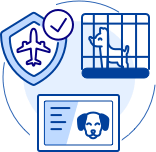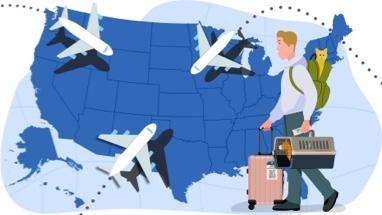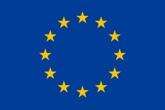Pet Travel From the United States to Singapore
Travel Requirements Based on Pet Type
Carefully read ALL of the requirements related to your pet on this page.
- This page provides the most recent entry requirements and can change without notice.
- It is the responsibility of the veterinarian to make sure the pet has met all health requirements of the destination country before issuing a health certificate.
- Failure to meet the requirements may result in problems gaining certificate endorsement or difficulties upon arrival in the destination country.
- Health certificates must be legible, accurate, and complete.
Visit Animal & Veterinary Service (AVS) web-site for the most recent requirements and more detailed information.
Dogs and cats must be identified with a microchip that is ISO compliant (11784 and 11785). If your dog/cat is implanted with a microchip which is not ISO compliant, you must provide a reader which is able to read the microchip at the point of entry into Singapore.
All rabies vaccinations must be administered by a licensed veterinarian. The rabies vaccination certificate(s) should include the following information:
- Microchip number of the pet
- Name and signature of veterinarian that vaccinated the pet
- Name and address of veterinary practice
Each pet must be accompanied by a valid import license and dog license (for dogs) issued by the veterinary authority (AVA) in Singapore.
- Dogs – The owner or agent must apply for a dog license prior to applying for the import license. Both licenses must be submitted thirty (30) days prior to arrival of the dog in Singapore.
- Cats – The owner or agent must obtain an import license by submitting an application thirty (30) days prior to arrival of the cat in Singapore.
- Application Process (AVA Singapore)
The following link will take you to the Animal & Veterinary Service of Singapore website for the most up-to-date versions of model health certificate.
PLEASE NOTE: The export health certificate below should be used for ALL U.S. origin pet dogs and cats, including those originating from Hawaii and Guam:
Dogs and Cats from USA (347.94 KB)
The owner or agent must make an appointment for the pet’s inspection at least 5 working days before the arrival of the animal by submitting an online booking request via AVA’s Intelligent Food Approval & Safety Tracking System (iFAST).
Visit the Aninal & Veterinary Service (AVS) of Singapore website for the most recent requirements and more detailed information: https://www.nparks.gov.sg/avs/pets/bringing-animals-into-singapore-and-exporting/import-export-and-transhipment-of-other-animals/ornamental-birds.
Ornamental birds are intended for purposes other than consumption, and include pet birds and birds for breeding. Examples of ornamental birds are guinea fowls, partridges, parrots, parakeets, budgerigars, cockatoos, doves, peafowls, swans and finches.
Pet owners and commercial traders are required to meet AVA’s requirements when importing, exporting or transshipping ornamental birds into, out of or via Singapore.
Additional permits are required to import, export or re-export endangered ornamental birds listed under the Convention on International Trade in Endangered Species of Wild Fauna and Flora (CITES). Examples of endangered ornamental birds include macaws, cockatoos and all except 4 species of parrots*.
For more information on the endangered animal species listed under CITES, please see the CITES appendices.
*Certain parrots are listed as highly endangered species under CITES Appendix I. This listing means that commercial import, export or re-export of the bird is not allowed unless the bird is bred in captivity in operations or farms that are registered with the CITES or used for non-commercial purposes. The 4 non-CITES listed parrot species are the Peach-Faced lovebird (Agapornis roseicollis), Budgerigar (Melopsittacus undulatus), Cockatiel (Nymphicus hollandicus) and Ring-necked parakeet (Psittacula krameri).
Follow the steps provided below to import ornamental pet birds into Singapore.
Effective March 16, 2022, the National Parks Board/Animal & Veterinary Service (NParks/AVS) of the Republic of Singapore has imposed temporary restrictions on the importation of ornamental birds from the 10 km radius restricted areas around the affected premises.
NOTE: For consignments of birds transiting HPAI affected countries enroute to Singapore, please seek AVA’s permission for the travel route. Transit of HPAI affected countries must not exceed 6 hours.
Ensure that the ornamental birds fulfill the Veterinary Conditions for Birds (Other than Domestic Birds).
This step only applies if you are importing CITES-listed ornamental birds.
Requirements to import CITES listed, endangered ornamental birds:
Check the CITES listed species list.
- a CITES import permit from AVA, and
- a CITES export/re-export permit from the country of export
| STEP | DESCRIPTION |
|---|---|
| STEP 1: | Obtain a CITES export/re-export permit from the competent authority of the country of export. |
| STEP 2: | Obtain a CITES import permit from AVA by applying online via the LicenceOne (AVA e-Licensing) website. Please note that you will need to log in to the LicenceOne (AVA e-Licensing) website and locate the specific CITES permit application service. The CITES import permit is valid for 90 days. |
| STEP 3: | Pay a fee of $12 per permit per species. The permits are subject to a minimum of $60 per consignment. |
View the step-by-step guide to apply for an import license.
Apply for an import license via the LicenceOne (AVA e-Licensing) website to bring ornamental birds into Singapore.
- Please note that you will need to log in to the LicenceOne (AVA e-Licensing) website and locate the specific import licensing service.
The license is valid for 30 days from date of issue.
Customs Clearance Permit
Each consignment must be accompanied by a Cargo Clearance Permit (CCP) for import clearance at the port of entry. You can obtain a CCP online via TradeNet.
You will need to provide the appropriate HS codes and product codes. For the list of products codes, see Product Codes for TradeNet.
Note: Wild caught birds from the United Stated are not permitted for import to Singapore.
Each consignment of ornamental pet birds must be accompanied by a Veterinary Health Certificate issued by a USDA Accredited Veterinarian after examination of the animal(s) no more than five (5) days prior to departure from the United States.
- Pet Birds - Health Certificate (186.16 KB) - August 2025
Make an appointment for an ornamental bird inspection by submitting an online booking request via AVA’s Intelligent Food Approval & Safety Tracking System (iFAST).
- Submit your request at least 5 days before arrival.
- Pets arriving for inspections without any prior appointment will be subject to an $80.00 inspection fee.
At the port of entry in Singapore, the birds and supporting documents will be inspected by an AVA Officer. Your consignment will be released if the documents are in order and birds are healthy.
Small mammals include rabbits, mice, hamsters, gerbils, guinea pigs and chinchillas.
Visit the Aninal & Veterinary Service (AVS) of Singapore website for the most recent requirements and more detailed information:
You can bring in small mammals from any country as long as your consignments meet AVA’s import requirements.
Below is an overview of the steps to follow when importing small mammals. Download AVA’s Veterinary Conditions of Small Mammals for more details on the import requirements.
Ensure that the small mammals intended for import fulfill the veterinary conditions stated in the Veterinary Conditions of Small Mammals.
Veterinary Conditions include treatment for parasites, no signs of certain diseases, etc. As some conditions carry specific timeframes, do read the conditions carefully.
Please note that personal pet owners have to have kept their small mammals as pets continuously since birth or for the past 6 months immediately prior to export.
All small mammals have to be placed under quarantine for a period of 2 weeks on arrival in Singapore. Please prepare proof of ownership if you have owned your small mammal for more than 6 months and attach it to your import license application.
For all others, please go to Animal Quarantine & AVA Border Control Checkpoints for more info on SAQS and reserving quarantine space.
Import Permits
Apply for an import license via the LicenceOne (AVA e-Licensing) website to bring small mammals into Singapore. The license is valid for 30 days from date of issue.
View the step-by-step guide to apply an import license.
Please note that you will need to log in to the LicenceOne (AVA e-Licensing) website and locate the specific import licensing service.
Singapore Customs Permit
Singapore Customs requires all pet owners bringing their pets into Singapore to apply for a customs permit via TradeNet for checkpoint clearance.
For enquiries on the customs permit, please contact Singapore Customs officers at:
- Tel: (65) 6355 2000
- Email: customs_documentation@customs.gov.sg
Each consignment must be accompanied by a Veterinary Health Certificate (438.8 KB) issued by a USDA Accredited Veterinarian and endorsed by USDA APHIS that meets the veterinary conditions stated in the Veterinary Conditions of Small Mammals.
Veterinary Conditions may include conditions like treatment for parasites, pre-export testing, no clinical signs of diseases, etc. As some conditions carry specific timeframes, do read the conditions carefully.
All small mammals arriving in Singapore must undergo inspection at AVA’s border control office (Changi Animal and Plant Quarantine Station or Tuas Checkpoint).
See Animal Quarantine & AVA Border Control Checkpointsfor more information on making an appointment for inspection.
Your imported small mammals will undergo veterinary inspection upon arrival in Singapore. Upon clearing customs, the animals will be transported to the quarantine facility.
See Animal Quarantine & AVA Border Control Checkpoints for more information on the arrival procedures.
For pet travel requirements not listed, APHIS has not been officially informed by the foreign country about the requirements for your pet’s travel. We recommend that you contact a government official of the country you are traveling to for more information.
Country of Destination Contact Information
Countries Participating in the European Union
Austria
Belgium
Bulgaria
Croatia
Cyprus
Czech Republic
Denmark
Estonia
Finland
France
Germany
Greece
Hungary
Republic of Ireland
Italy
Latvia
Lithuania
Luxembourg
Malta
Netherlands
Northern Ireland*
Norway**
Poland
Portugal
Romania
Slovakia
Slovenia
Spain
Sweden
Switzerland**
* Northern Ireland is part of the United Kingdom (UK), but will continue to follow European Union (EU) requirements even though the UK is no longer part of the EU.
** Norway and Switzerland are not part of the EU but have adopted EU legislation for import of most species of live animals.
Need Help?
Still Have Questions?
USDA-Accredited Veterinarians
Contact a USDA-accredited veterinarian for questions about your destination country's entry requirements for pets (including any needed vaccinations, tests, or treatments) and for issuance of health certificates.
Find a USDA-Accredited Veterinarian
USDA Endorsement Offices
Contact your nearest APHIS Veterinary Export Trade Services Endorsement Office for questions about endorsing a health certificate for pets.
Looking for Another Country?
Find your destination country requirements by using the dropdown menu below. If your country is not listed in the menu, visit Pet Travel: Unknown Requirements.




